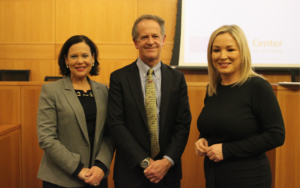The United Kingdom’s exit from the European Union has reopened long settled agreements between the Republic of Ireland and the United Kingdom concerning Northern Ireland and brought new attention to the unresolved questions on the island’s future. Ahead of the May election in Northern Ireland, leaders from Irish political party Sinn Féin visited Fordham Law School on March 14. Mary Lou McDonald and Michelle O’Neill, party president and vice president respectively, joined Martin S. Flaherty, Leitner Family Professor of Law and founding co-director of the Leitner Center for International Law and Justice, to discuss both the legal and political changes underway in Ireland and the provisions of the Belfast/Good Friday Agreement that was reached on April 10, 1998. The event was co-sponsored by the Leitner Center and the Feerick Center for Social Justice.
“We are very honored to have here two women, who are not only the new faces of their party, but possibly the new faces of Ireland—North and South—in the not-too-distant future,” Flaherty said during his opening remarks. “As women, they undermine what has historically been an old boys network when it comes to governance. But they are also advocates for progressive social democratic reform on both parts of the island.”

In the last Irish election in 2020, Sinn Féin won a plurality of the vote, a historic victory for the party and for McDonald, who became the first woman to lead the opposition in the Dáil Éireann—the lower house of the Oireachtas, or Irish Parliament. She was also the first woman and Sinn Féin’s first member to represent the Republic of Ireland in the European Parliament. There is a strong possibility that Sinn Féin may be able to constitute a government in the next election, meaning McDonald could become taoiseach, or prime minister.
O’Neill is the former deputy first minister for Northern Ireland, serving in the role from January 2020 to February 2022. Prior to holding that position, she was the first female mayor of Dungannon and South Tyrone and served as the minister of agriculture and rural development and minister of health in Northern Ireland.
“How you express your leadership in your country—which is also my country, as my parents were born in County Mayo—is remarkable,” said Dean Emeritus and Norris Professor of Law John D. Feerick ’61 to McDonald and O’Neill. “We are honored by your presence at Fordham Law School.”
The Possibility of a United Ireland
McDonald and O’Neill argued that unity for the island of Ireland is inevitable, stating that Ireland “has been on a long, slow, and sometimes very painful march to full national self-determination [and]full freedom.”
“We believe, and Sinn Féin believes, that we are on the verge of something momentous and historic,” said McDonald. “We believe, in the course of this decade, we will in fact witness and drive an orderly, peaceful, and democratic constitutional transition on the island of Ireland.”
The next Northern Ireland Assembly election is scheduled to take place on May 5—the first since 2017. If Sinn Féin, the only party working to achieve Irish unity, were to emerge as the majority party in the North, O’Neill would be nominated as first minister, becoming the first non-Unionist to hold the position.
O’Neill was 21 years old when the Belfast/Good Friday Agreement was signed nearly 25 years ago. She explained that she voted for it then, continues to believe in it now, and wants to defend it. “I voted for it because there was a democratic and peaceful pathway towards unity, and it was a way for me to pursue my political aspirations,” O’Neill said. “The Good Friday Agreement provides for continuity, the protection of rights, and respect for identity in a united Ireland.”
“Despite all the challenges of governance and the politics in the North, I think that there’s a huge opportunity ahead of us,” she said. “We’re determined to try to lead that change, working with others on whatever comes [our way]in the next decade.”
Looking Ahead
When asked how they would mitigate opposition in the Unionist community and allay fears of “not belonging” in a united Ireland, McDonald explained that issues involving identity have already been resolved through the Belfast/Good Friday Agreement. “Somebody living in the north of Ireland today, who is British, will be British tomorrow, next year, and in a decade’s time. In a partitioned Ireland and in a united Ireland, they will be British,” she said. “The issue that does arise is how will the British state recognize that? What does that mean for British citizens in terms of the rights that they might access through that jurisdiction?”
Given the possibility of a referendum for a united Ireland under the Belfast/Good Friday Agreement, McDonald and O’Neill emphasized the need for planning and preparation. They also explained that they would call for an island-wide structured conversation about the prospects of reunification.
“It’s important for us to say very clearly in a forum like this, amongst lawyers in particular, that our right to a referendum is not under dispute. We have in an internationally binding accord, provisions for referendums—North and South—to decide this matter,” McDonald said. “Therefore, it is incumbent on the parties to have a sense of preparation for those referendums in real time.”

